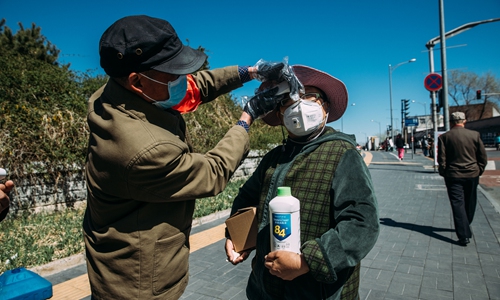HOME >> CHINA
Beijing likely to remain in a state of COVID-19 prevention and control for a long time: official
Source:Global Times Published: 2020/4/5 23:29:29

On Friday, community workers in Laoshan Community in West Beijing’s Shijingshan district conduct a range of measures like disinfection, checking temperatures and setting up smart monitors to ensure residents’ safety as China’s capital faces increasing pressure of imported cases from abroad and returnees from other parts of China. (Photo: Li Hao/GT)
As the global pandemic of COVID-19 continues to accelerate, it is impossible for Beijing, an international communication center, to completely end the pandemic in a short time. Beijing is likely to remain in a state of coronavirus prevention and control for a long time.
Xu Hejian, spokesperson of the Beijing Municipal government, said at the press conference on the pandemic on Sunday that the situation of pandemic prevention and control in the capital city is still grim and complicated, and the prevention and control work will become normal, Xinhua reported.
Beijing will continue to adhere to the strategy of preventing both imported cases of COVID-19 and a rebound of local cases, Xu said.
Xu also noted that when domestic spread of the virus has been basically stopped nationwide and in Beijing, authorities will seize the best opportunity to speed up the resumption of production and work and make every effort to resume normal life.
The government will formulate a series of policies to support the resumption of production and employment, Xu said.
As of Saturday, Beijing had reported 170 imported cases of coronavirus, and 416 local infections.
Beijing also reported two confirmed imported cases on Saturday who had symptoms but did not report, which caused hidden transmission danger.
One patient came back with her husband from the UK on March 20 and was quarantined in a centralized location. On March 30, she suffered from mild symptoms but self-medicated and did not report to authorities. After she returned home on April 3, she had a fever. She was taken to the hospital on April 4 and was tested positive for COVID-19.
Pang Xinghuo, deputy director of the Beijing Centers for Diseases Control and Prevention, warned at Sunday's press conference that people must report their health conditions truthfully or they will delay the treatment and increase the risk of infecting others.
Global Times
Posted in: SOCIETY